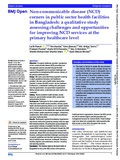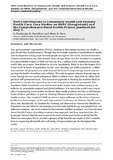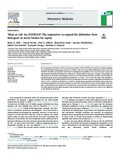Non-communicable disease (NCD) corners in public sector health facilities in Bangladesh: A qualitative study assessing challenges and opportunities for improving NCD services at the primary healthcare level

View/Open
Date
2019-10-07Publisher
BMJ JournalsAuthor
Rawal, Lal BKanda, Kie
Biswas, Tuhin
Tanim, Md. Imtiaz
Poudel, Prakash
Renzaho, Andre M N
Abdullah, Abu S
Shariful Islam, Sheikh Mohammed
Ahmed, Syed Masud
Metadata
Show full item recordCitation
Rawal, L. B., Kanda, K., Biswas, T., Tanim, M. I., Poudel, P., Renzaho, A., Abdullah, A. S., Shariful Islam, S. M., & Ahmed, S. M. (2019). Non-communicable disease (NCD) corners in public sector health facilities in Bangladesh: a qualitative study assessing challenges and opportunities for improving NCD services at the primary healthcare level. BMJ open, 9(10), e029562. https://doi.org/10.1136/bmjopen-2019-029562Abstract
Objective To explore healthcare providers’ perspective
on non-communicable disease (NCD) prevention and
management services provided through the NCD
corners in Bangladesh and to examine challenges and
opportunities for strengthening NCD services delivery at
the primary healthcare level.
Design We used a grounded theory approach involving
in-depth qualitative interviews with healthcare
providers. We also used a health facility observation
checklist to assess the NCD corners’ service readiness.
Furthermore, a stakeholder meeting with participants
from the government, non-government organisations
(NGOs), private sector, universities and news media was
conducted.
Setting Twelve subdistrict health facilities, locally
known as upazila health complex (UHC), across four
administrative divisions.
Participants Participants for the in-depth qualitative
interviews were health service providers, namely upazila
health and family planning officers (n=4), resident medical
officers (n=6), medical doctors (n=4) and civil surgeons
(n=1). Participants for the stakeholder meeting were health
policy makers, health programme managers, researchers,
academicians, NGO workers, private health practitioners
and news media reporters.
Results Participants reported that diabetes, hypertension
and chronic obstructive pulmonary disease were the major
NCD-related problems. All participants acknowledged the
governments’ initiative to establish the NCD corners to
support NCD service delivery. Participants thought the NCD
corners have contributed substantially to increase NCD
awareness, deliver NCD care and provide referral services.
However, participants identified challenges including lack
of specific guidelines and standard operating procedures;
lack of trained human resources; inadequate laboratory
facilities, logistics and medications; and poor recording
and reporting systems.
Conclusion The initiative taken by the Government of
Bangladesh to set up the NCD corners at the primary
healthcare level is appreciative. However, the NCD corners
are still at nascent stage to provide prevention and
management services for common NCDs. These findings
need to be taken into consideration while expanding the
NCD corners in other UHCs throughout the country
Keywords
Health policy; Health services administration & management; Non-communicable disease; Organisation of health services; Public health; Service deliveryDescription
This article was published in The BMJ Open [ © Author(s) (or their employer(s)) 2019. Re-use permitted under CC BY-NC. No commercial re-use. See rights and permissions. Published by BMJ.] and the definite version is available at: http://dx.doi.org/10.1136/bmjopen-2019-029562. The Journal's website is at: https://bmjopen.bmj.com/content/9/10/e029562Publisher Link
https://bmjopen.bmj.com/content/9/10/e029562Department
Brac James P. Grant School of Public HealthType
Journal ArticleCollections
Related items
Showing items related by title, author, creator and subject.
-
NGO contributions to community health and primary health care: Case studies on BRAC (Bangladesh) and the Comprehensive Rural Health Project, Jamkhed (India)
Chowdhury, A. Mushtaque R.; Perry, Henry B. (Oxford University Press, 2020-04-30)Non-governmental organizations (NGOs) working in developing countries are chiefly a post-World War II phenomenon. Though they have made important contributions to health and development among impoverished people throughout ... -
‘Most at risk’ for COVID19? The imperative to expand the definition from biological to social factors for equity
Afifi, Rima A.; Novak, Nicole; Gilbert, Paul A.; Pauly, Bernadette; Abdulrahim, Sawsan; Rashid, Sabina Faiz; Ortegae, Fernando; Ferrand, Rashida A. (Elsevier, 2020-08-06)First recognized in December 2019, the Coronavirus Disease 2019 (COVID19) was declared a global pandemic by the World Health Organization on March 11, 2020. To date, the most utilized definition of ‘most at risk’ for COVID19 ... -
Health and population programme: July 1993-December 1994 report
BRAC (© BRAC, 1995)



